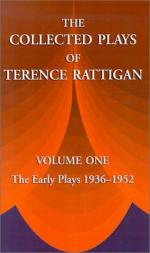|
This section contains 4,121 words (approx. 14 pages at 300 words per page) |

|
SOURCE: Innes, Christopher. “Terence Rattigan: The Voice of the 1950s.” In British Theatre in the 1950s, edited by Dominic Shellard, pp. 53-63. Sheffield, Eng.: Sheffield Academic Press, 2000.
In the following essay, Innes regards Rattigan's plays as embodying the social and cultural consciousness of the 1950s.
Rattigan has had an unusually, indeed undeservedly bad press. Ever since the 1950s his work has been treated with critical disdain. He is almost always represented as the potentially serious playwright who sold out to popularity; who substituted craftsmanship for vision, dealing (one critic as early as 1953 remarked) ‘less in terms of observed life than in those of observed theatre’.1 Undeniably, there's a certain truth in all that. However, on a quite different level, Rattigan's plays express the essential quality of English society as a whole in the 1950s. The deeper, conceptual structure of his drama can be seen as embodying dominant aspects...
|
This section contains 4,121 words (approx. 14 pages at 300 words per page) |

|


